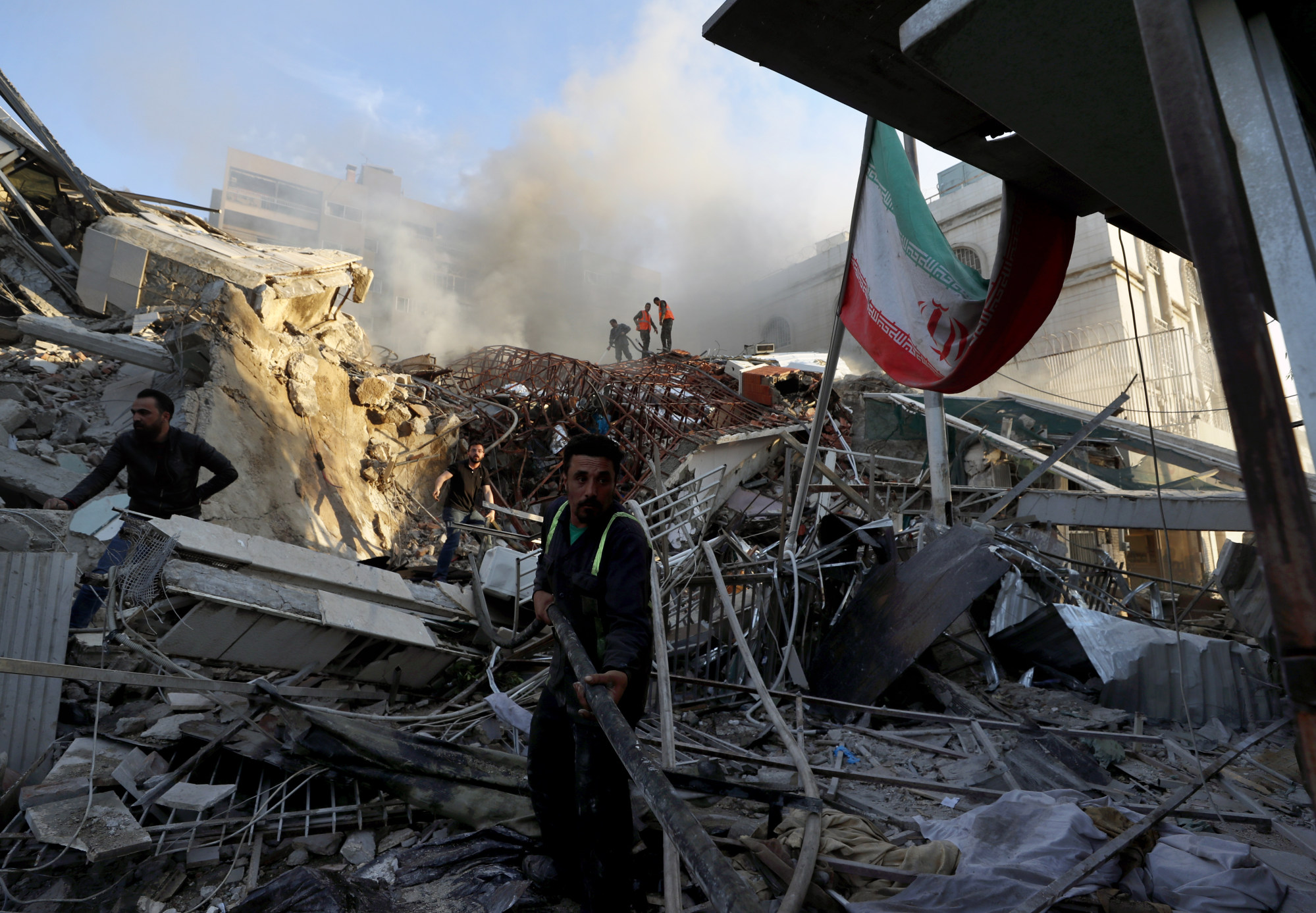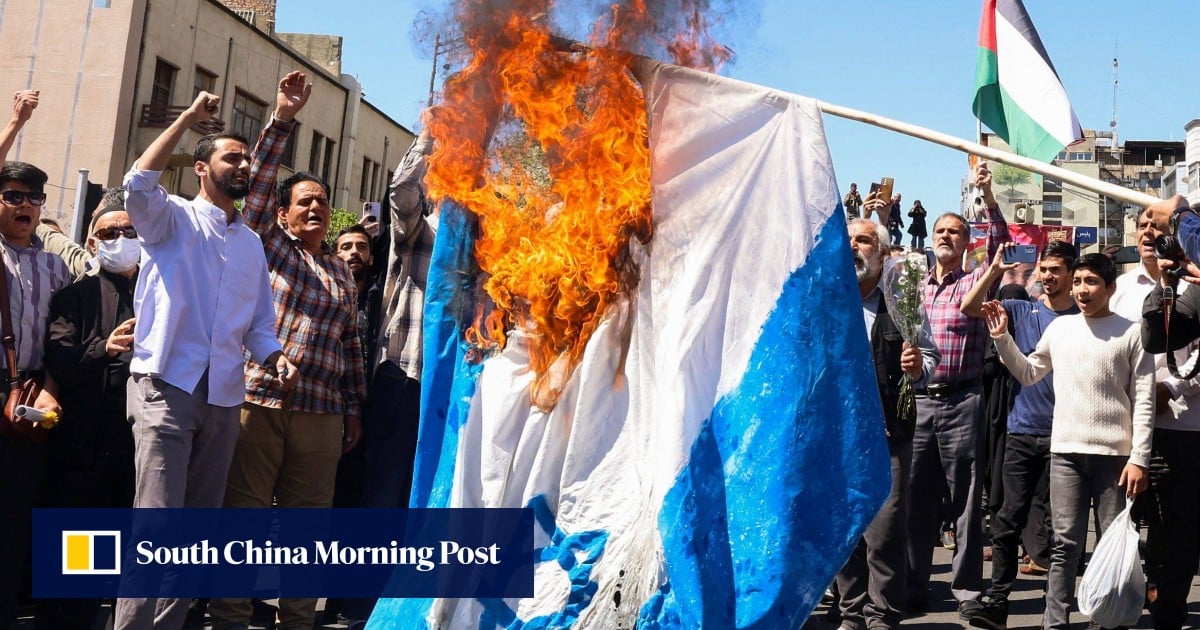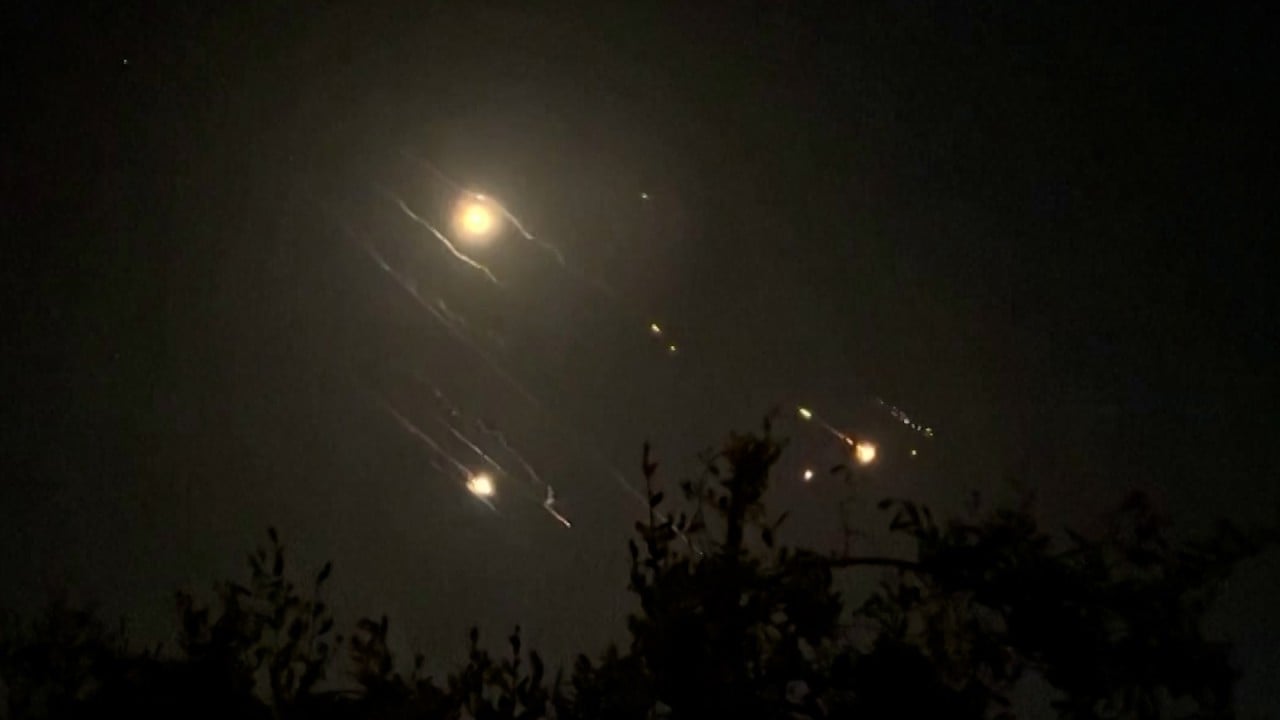Tensions between Iran and Israel had “taken the Middle East to the edge of the precipice with the threat of a regional war greater than ever”, said Maha Yahya, director of the Malcolm H. Kerr Carnegie Middle East Centre, a Beirut-based think tank.
For Southeast Asians, worries about Israel-Gaza war trump even South China Sea
For Southeast Asians, worries about Israel-Gaza war trump even South China Sea
“The embassy attack was seen as an assault on sovereign Iranian territory, which, if left unaddressed, could ultimately encourage direct Israeli attacks against Iran itself,” Yahya said.
Iran’s response to Israel’s killing of IRGC officers on diplomatic premises “doesn’t just move the situation up the escalatory ladder – it obliterates the ladder”, said Jonathan Panikoff, a former deputy national intelligence officer for the Near East at the US National Intelligence Council.
The first-ever direct Iranian attack on Israel “shatters the previous conflict threshold in the long-running war between Israel and Iran, bringing it out of the shadows and into the light”, he said.
“What is clear is that this is the beginning of a new era, one in which Iran is willing to respond directly to Israeli attacks and in doing so risk retaliation against the Iranian homeland,” said Panikoff, who is the director of the Scowcroft Middle East Security Initiative at the Atlantic Council, a Washington think tank.
Iran said its decision to respond in such a dramatic manner to the Israeli air strike was meant to re-establish deterrence against such attacks against its sovereign interests and personnel.
“The direct and targeted strikes at Israel aimed at restoring Iranian deterrence also showed Tehran’s changed calculus and risk appetite,” according to a paper published by the British think tank Chatham House on Monday.
It cautioned against the popular perception that the attack was a massive failure given the near-perfect rate of interceptions of Iranian drones and missiles by Israel’s layered missile defence architecture.
“Had Iran’s intent been to hurt Israel, it wouldn’t have violated a core principle of military operations – the element of surprise,” it said.
“Indeed, had Iran sought to inflict serious pain on Israel, it would have incorporated a heavier dose of fast-flying and precision-guided ballistic missiles” as part of offensive tactics that would have “significantly challenged and possibly overwhelmed Israeli defences”, Chatham House said.
Iran also would have integrated the significant combat power of its regional proxies, especially Lebanese Hezbollah, into its operation, “turning this into a real multi-front conflict and a nightmare for Israel”.
Timing might be also key to Iran’s thinking, it said.
Israel’s attack on the Iranian consulate was representative of the new approach it has adopted against Iran and the broader Axis of Resistance since the Hamas attack last October “exposed that Israel’s previous strategy had failed to ensure its security”, Chatham House said. The Axis of Resistance refers to an informal coalition that includes Iran and its allies in Middle Eastern countries such as Syria and Lebanon against Israel, the US and others.
Since then, Israel has been “strategically targeting key coordinating figures” of the Axis as well as Iranian assets and individuals across its borders, it observed.
During that period, at least 18 members of the IRGC’s overseas arm, the Quds Force, have been killed, in addition to the seven killed in the Damascus embassy compound.
US diplomatic intervention prevented Israel from launching pre-emptive strikes against Hezbollah immediately after the Hamas attack in October, primarily because Washington did not want to be sucked into a war that would almost certainly involve Iran.
Israeli man charged with trafficking guns into Malaysia, faces decades in jail
Israeli man charged with trafficking guns into Malaysia, faces decades in jail
To reassure Israel, the US instead deployed an aircraft carrier task force to the Eastern Mediterranean, and alongside France has diplomatically engaged Hezbollah through Lebanese intermediaries in an attempt to secure an agreement preventing the outbreak of war with Israel.
Israel and Hezbollah have since ramped up their tit-for-tat attacks in phases, with Israeli warplanes and drones striking ever further north into Lebanese air space to hit the militia’s command structure.
Hezbollah, meanwhile, has deployed increasingly powerful weapons and extended its attacks eastward to target Israeli forces occupying the neighbouring Golan Heights in Syria.
Israel has rejected most US entreaties to limit its military operations since October and did not forewarn Washington about its attack on the Iranian consulate in Damascus, according to multiple news reports in the US media.
Analysts said Iran would feel obliged to come to the aid of Hezbollah because the destruction of the Lebanese militia would deprive it of its primary deterrent against an Israeli attack on Iranian soil.

“To decisively weaken the Iranians and their nuclear programme are Israeli priorities,” Young said.
But Israel needed US participation in any bombing campaign against the Islamic Republic “for this to succeed, with the added hope that Iran’s leadership can be overthrown”, he said.
Washington has repeatedly avoided this, preferring instead to manage the situation through the imposition of economic sanctions on Iran alongside the basing of substantial military forces in the Persian Gulf.
Singapore minister’s visit to Palestinian territories a ‘visible gesture’
Singapore minister’s visit to Palestinian territories a ‘visible gesture’
Nuclear tensions
Since then, Israel has conducted covert operations in Iran including the sabotage of nuclear facilities and the assassination of top scientists.
Iran has responded to US and Israeli pressure by building new, better-protected nuclear facilities and accelerating the enrichment of uranium to levels close to weapons grade.
So a large-scale attack “risks Iran retaliating beyond hardening its facilities and accelerating its programme and could push Tehran to make the political decision that nuclear weapons are necessary to deter future attacks on its territory”, said Kelsey Davenport, director of non-proliferation for the Arms Control Association in Washington.
In the event of an Israeli attack on Iran’s nuclear facilities, “it would be possible and foreseeable to revise Iran’s nuclear doctrine and policies and deviate from the previously declared considerations” said Ahmad Haghtalab, the IRGC general in charge of security at the facilities, on Thursday.
Iran would likely withdraw from the Treaty on the Non-Proliferation of Nuclear Weapons in this scenario, removing any obligation for it to allow inspections of its facilities by the International Atomic Energy Agency, the UN’s nuclear watchdog, Davenport said.
This would make it more difficult for the West to rally the international community to pressure Iran to refrain from building a nuclear arsenal and negotiating constraints on its programme.
Even if the US were to agree to carry out military strikes, it would not completely obliterate Iran’s most secure nuclear facilities, and its programme would rebound within a few years.

“Iran’s nuclear programme is too advanced and dispersed for the proliferation risk to be effectively neutralised by military strikes,” Davenport said. Tehran already has the necessary capabilities to build nuclear weapons and that knowledge “cannot be bombed away”.
“Striking Iran’s facilities now would set back the programme but those setbacks would be relatively short in duration,” she said.
On the other hand, although Israel denies possessing nuclear weapons, it received uranium enrichment technology from France in 1957 and is believed by strategic weapons researchers to have built up an arsenal of 80 to 90 warheads deliverable by domestically developed ballistic missiles, US-supplied warplanes and German submarines.
In its annual report on adherence and compliance with arms control, non-proliferation, and disarmament agreements and commitments, the US State Department on April 12 said Iran had continued to expand its uranium enrichment activities and stock of enriched uranium, including by further deploying advanced centrifuges.
Iran’s enriched uranium stockpile and the enrichment efficiency of its centrifuges are key factors in the amount of time the US assesses would be required for Iran to produce enough fissile material for a nuclear weapon should Iran decide to build one.
“The US continues to assess that Iran is not currently undertaking the key nuclear weapons-development activities that we assess would be necessary to produce a testable nuclear device,” the State Department reported.


